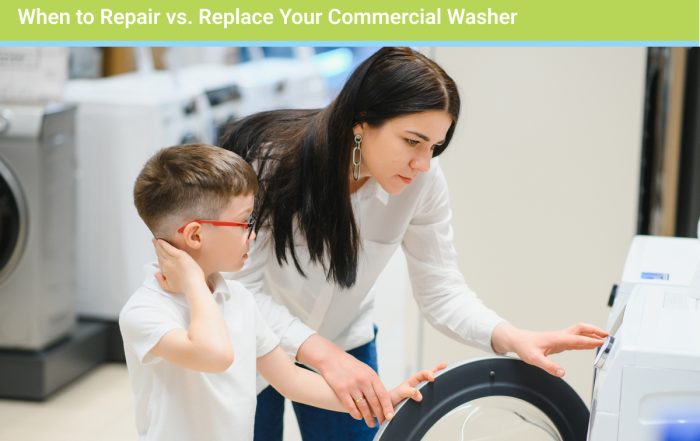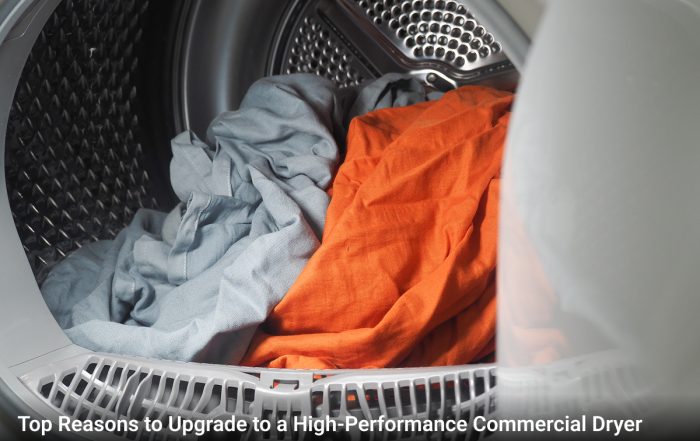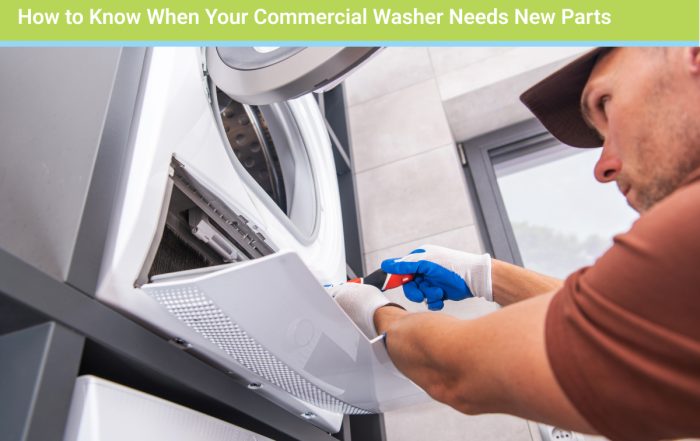
Washer Extractors vs. Washing Machines
Selecting the right laundry equipment for your business can significantly impact your bottom line, workflow efficiency, and daily operations. Whether you run a hotel, gym, or healthcare facility, your laundry needs are likely substantial, and choosing the right machines can ensure that operations run smoothly while optimizing costs. In this blog, we’ll explore the differences between washer extractors and regular commercial washers, focusing on load capacity, ease of use, cost, long-term savings, maintenance, and durability. By the end, you’ll have a clearer idea of which machine might best fit your business.
Understanding Washer Extractors and Regular Commercial Washers
First, let’s clarify what distinguishes these two types of machines:
Washer extractors are high-performance machines designed for heavy-duty use. They feature high spin speeds, extracting more water from each load, resulting in shorter drying times. These machines are ideal for businesses with high laundry demands, offering faster cycle times and higher load capacities.
On the other hand, regular commercial washers offer a more straightforward washing experience. They are versatile and generally easier to operate, making them suitable for businesses that don’t have high-volume laundry needs or require specialized washing functions. While they may not have the same extraction power as washer extractors, they do the job efficiently, especially in businesses where laundry turnover isn’t as time-sensitive.
Load Capacity Comparison
One of the first things to consider is how much laundry your business processes daily. High-volume operations, such as hotels or large fitness centers, often require machines with larger load capacities to efficiently handle sheets, towels, uniforms, and other items. This is where washer extractors shine.
Washer extractors are built for heavy loads, allowing businesses to clean more items in a single cycle. This can significantly reduce daily cycles, freeing up time and resources for other tasks. On the other hand, regular commercial washers may have smaller capacities, which can limit their ability to handle large laundry loads efficiently. However, these machines can still be a great choice for businesses with lower laundry volumes, as they are generally less complex and easier to integrate into smaller laundry rooms.
Ease of Use and Operational Convenience
When it comes to ease of use, regular commercial washers have a clear advantage. These machines tend to have simpler control panels and require minimal training to operate. Regular washers can be more practical for businesses with frequent employee turnover or staff who may not have specialized laundry experience. Their straightforward design means that anyone can quickly learn to operate them, reducing the chances of operational errors.
On the other hand, washer extractors may come with more advanced features and settings. While these added functionalities can improve efficiency and provide more control over washing cycles, they may require some initial staff training. Once employees are familiar with the machine, though, these features can streamline processes, particularly in high-demand settings. For instance, faster spin cycles and customizable washing settings allow you to tailor each wash to the specific type of fabric or level of soiling, which can be particularly beneficial in industries where sanitation and fabric care are priorities.
Cost Considerations and Long-Term Savings
Budget is often a primary consideration when choosing laundry equipment. It’s important to evaluate both the initial investment and the long-term savings each machine type might offer.
Washer extractors typically cost more upfront than regular commercial washers. However, they can provide considerable long-term savings. Due to their powerful spin cycles, washer extractors remove more water from each load, reducing drying times. Shorter drying times mean reduced energy costs and faster turnaround times, allowing businesses to operate more efficiently. Over time, the energy savings can help offset the initial investment, making washer extractors a cost-effective choice for businesses with high laundry demands.
In contrast, regular commercial washers generally have a lower purchase price, making them attractive to smaller businesses or those just starting out. While they may not offer the same energy savings as washer extractors, their lower price point and simpler design can make them a good fit for businesses with modest laundry needs. For operations where laundry is a less critical part of daily activities, regular washers may provide the functionality needed without the added expense.
Maintenance Requirements and Durability
Maintenance is another crucial factor, as unexpected breakdowns can disrupt operations and lead to costly repairs.
Washer extractors are typically more complex machines, which means they may require specialized maintenance and service from trained technicians. The upside is that these machines are built for heavy-duty use and are often highly durable when properly maintained. However, businesses should be prepared for higher maintenance costs and ensure they have access to service providers who understand these machines.
Regular commercial washers, being simpler in design, usually have lower maintenance needs and can often be serviced by general appliance technicians. This can save on repair costs and downtime, which is particularly beneficial for smaller businesses. While they may not be as robust as washer extractors, regular commercial washers are still built for frequent use and can last long with proper care.
Which Machine Is Right for Your Business?
Ultimately, choosing between washer extractors and regular commercial washers depends on your business’s unique needs.
A washer extractor could be the right choice if your business has high laundry demands. Its ability to handle larger loads, faster drying times, and potential for long-term savings make it a strong investment for larger operations. These machines may come with a higher initial cost, but for high-demand businesses, their efficiency and durability can provide a significant return on investment.
On the other hand, if your laundry needs are moderate and simplicity is a priority, a regular commercial washer may be sufficient. These machines offer ease of use, lower upfront costs, and straightforward maintenance, making them a practical choice for businesses with lighter laundry loads.
Selecting the right laundry equipment for your business is more than just a financial decision—it’s about finding the solution that aligns with your operational needs, budget, and long-term goals. Both washer extractors and regular commercial washers have their benefits, and understanding these differences can help you make an informed choice.
At Coronet, we specialize in helping business owners find the best laundry solutions for their unique requirements. Contact Coronet today to discuss your options and discover the machine that best fits your business’s laundry needs. Whether you’re looking for a powerful washer extractor or a reliable commercial washer, our team guides you every step of the way.
Recent Posts
When to Repair vs. Replace Your Commercial Washer
For businesses that depend on reliable laundry operations, from hotels and healthcare facilities to laundromats and multi-unit housing, deciding whether to repair or replace your commercial washer is a critical choice. The decision affects not [...]
Top Reasons to Upgrade to a High-Performance Commercial Dryer
For businesses that rely on laundry, whether laundromats, hospitality, healthcare facilities, multi-housing complexes, or on-premise laundry operations, choosing the right commercial laundry equipment is essential. While many companies focus on washers first, upgrading your commercial [...]
How to Know When Your Commercial Washer Needs New Parts
A dependable commercial washer is essential for any high-volume laundry operation. Over time, however, even the most durable machines experience wear on critical components. The good news is that washers usually show early warning signs [...]



